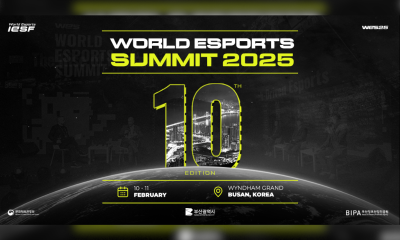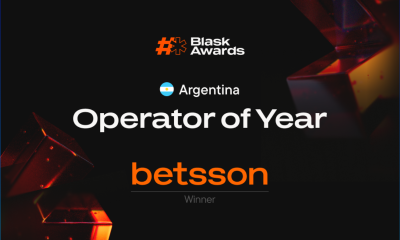Latest News
Tackling latency in next-gen gaming

Mathieu Duperré, CEO at Edgegap
Anyone that’s played a video game online has almost certainly experienced some kind of lag and connectivity issues. Despite huge infrastructure advances in the last few decades, latency remains a constant thorn in the side of gamers and detracts from the real-time experience that’s expected today.
Delivering a consistent experience to gamers playing on different devices with varying connection speeds – many of which are separated by thousands of miles – is a complex challenge. Massively popular online games like Roblox and Fortnite are just two of the many games which have benefited from years of investment into infrastructure in order to support millions of concurrent players. As the below chart from SuperJoost shows, multiplayer and online gaming is becoming the preferred way to play games amongst the most active gaming demographic, with all the technical challenges that this creates.
Games which can be played seamlessly across mobile, PC and console (so-called cross-play games) are also pushing the limits of what current internet infrastructure can deliver. Add in a new generation of streaming cloud gaming services like Stadia, Blacknut Games and Amazon’s Luna – plus Microsoft’s Game Pass and Sony’s revamped PlayStation Plus service, and you can see how the promise of console-quality performance over a broadband connection risks overloading networks that were never designed for this level of gaming.
So how can game companies, telcos and ISPs deliver on the performance promises being made to gamers? That’s where edge computing comes in.
Lag, latency and the Edge
When talking about latency it’s important to make it clear exactly what we mean. Latency refers to the amount of time it takes for game data to travel from one point to another. From the gamer’s perspective, it’s the delay between their command and seeing it happen in-game. How much latency a gamer experiences is dependent on the physical distance the data must cross through the multiple networks, routers and cables before it reaches its destination.
To use an extreme example, NASA’s Voyager 1 has made it about 14.5 billion miles from our planet so far, and it takes about 19 hours for its radio waves to reach us. Here on Earth, your latency is (hopefully) measured in milliseconds rather than hours; and gamers need around 30ms for the most optimal performance. Anywhere above 100ms can lead to noticeable lag and a frustrating experience.
This is where Edge computing comes in. As the name implies, Edge computing brings computation and data storage closer to the sources of data, placing it on the edge of the network where the performance gain is the greatest. As you’d expect, reducing unnecessary travel drastically speeds up the process providing an almost lag-free experience.
More players equals more chance for latency to be a problem
In the early days of gaming, local, couch play was part and parcel of the gaming experience. Today, a game where hundreds or even thousands of players are in the same session is nothing out of the ordinary, and there are Battle Royale games now, a whole genre of games where a hundred or more players are whittled down to a single winner.
The sheer scale of some online games dwarfs many of the most popular streaming services. Whilst Netflix remains the most successful streaming video site with 222 million subscribers, kids game Roblox has 230 million active accounts and Fortnite has over 350 million registered players. So if we assume these games reflect a growing trend, the demand on server networks is only going to increase, and gaming companies will have to look for more innovative solutions to continue meeting demand.
Cross-Platform
The ability for gamers on different devices and platforms to play and compete together is becoming an increasingly common feature of AAA multiplayer games like Apex Legends, Fornite and Call of Duty. EA Sports recently confirmed that FIFA 23 will be joining other heavy hitters in exploring cross-platform play. Considering the large amount of games on the market, and the various game modes for each game, studios are looking at crossplay to increase the amount of players who can play together. One of the main driver is to lower matchmaking time and prevent players from having to wait hours before opponents are ready to play with them.
From a latency perspective, different infrastructure across platforms means lag and downtime are far more likely. When it comes to cross-play, studios can’t use P2P (peer-to-peer) since console vendors don’t support direct communication (i.e. an Xbox can’t communicate directly with a playstation). On top of that, P2P may be limited by player’s home network (restrictive natting for example). That’s why studios typically use relays in a handful of centralised locations. Relays are seen as cheaper than authoritative server. They although have large flaws like making it harder for studios to prevent cheating, which is becoming more and more important with Web3 & NFT. This causes higherlatency since traffic needs to travel longer distances between players. For example, when Apex Legends went cross-platform, players were inundated with frame rate drops, lags and glitches.
Edge computing allows studios to deploy cross-play games as close as possible to their players, significantly reducing latency. Which can negate some of the delay issues around differing platforms.
VR and the Metaverse
Despite hitting shelves in 2016, VR is only now slowly making its way into mainstream gaming. Advances in technology have gradually improved the user experience, while also bringing the price of hardware down and closer to the mass market – not to mention the metaverse bringing renewed attention to the tech. But latency issues still present a serious hurdle to wider adoption unless it’s addressed.
Latency impacts the player experience far more in VR than in traditional gaming as it completely disrupts the intended immersive experience. A 2020 research paper found latency of over 30-35ms in VR, had a significant impact on players’ enjoyment and immersion, which was far lower than acceptable margins on a controller. But when it comes to the metaverse, achieving this might not be enough. Latency between headset and player has to be sub 5ms to prevent motion sickness.
In a recent blog, Meta’s VP, Dan Rabinovitsj, explained that cloud-based video games require a latency of around 75–150ms, while some AAA video games with high graphical demand require sub 35ms. Comparatively, Rabinovitsj suggests metaverse applications would need to reduce latency to low double or even single digits.
For better or worse, we’ve seen glimpses of what the metaverse has to offer already. Decentraland’s metaverse fashion week gave major brands like Dolce & Gabbana an opportunity to showcase virtual versions of their products. But attending journalists reported that the event was fraught with lag and glitches.
Gamers are a fickle bunch, so early adopters will simply move back to other games and platforms if they have poor initial experiences. Google’s Stadia promised to revolutionise gaming, but its fate was sealed at launch as the platform simply couldn’t compete with its competitors’ latency. Today, Google has ‘deprioritised’ the platform in favour of other projects.
If the metaverse goes to plan, it should encompass a lot more than traditional gaming experiences. But if it’s going to live up to players’ lofty expectations, akin to Ready Player One, more thought needs to be given to scalable and optimised infrastructure.
Unlocking next-gen gaming
The pace at which modern gaming is evolving is astounding, making the components discussed here work lag-free and as players expect will be a huge undertaking, and even more so when developers attempt to bring them all together in the metaverse.
The issue of latency may be less headline-grabbing than virtual fashion shows, NFTs and Mark Zuckerberg’s slightly unsettling promotional video, but the ability to seamlessly stitch all of these elements together will be critical in making the metaverse live up to expectations, and therefore, to its success.
Powered by WPeMatico
Champions League
Flashscore reveals data behind thrilling night of Champions League action

New data from Flashscore, the world’s leading platform for live scores and sports content, reveals that almost 34,000,000 users tuned in yesterday for one of the most dramatic nights in UEFA Champions League history.
The intensity of the matches generated a massive wave of digital engagement, with 18 matches all taking place at the same time on the final day of the league format.
From the football-mad streets of Brazil to the frozen research stations of Antarctica, fans across 239 countries and territories checked their phones as Benfica’s goalkeeper scored a 98th-minute header and Real Madrid crashed into the playoffs.
Martin Matejka, Marketing Director of Flashscore, said: “Yesterday wasn’t just a matchday; it was a global event and we were well prepared. When game-changing moments decide matches – from a goalkeeper’s stoppage-time header against Real Madrid to last-minute winners across Europe – the world doesn’t just watch, it reacts. Flashscore sent out over 700 million push notifications to our users as drama unfolded across the continent.
“Our data shows unprecedented engagement from all over the world, and I am glad we could bring these extraordinary moments to fans from Brazil to Antarctica.”
TOP MATCHES ranked by number of users
The drama at the Estádio da Luz dominated the global conversation, with nearly 10 million users following the Benfica-Madrid clash alone.
1 Benfica vs. Real Madrid (9,7M users): The undisputed main event. Fans flocked to the match detail as Benfica goalkeeper Anatoliy Trubin scored a historic 98th-minute header to seal a 4-2 win, sending Real Madrid to the playoffs.
2 Barcelona vs. FC Copenhagen (8,3M users): Massive interest as Barcelona thrashed the Danes 4-1 to secure direct qualification to the Round of 16.
3 Napoli vs. Chelsea (5,9M users): A rollercoaster in Naples. Chelsea fought back to win 3-2, eliminating Napoli despite a stunning “Maradona-esque” pirouette goal from Antonio Vergara.
TOP PLAYERS ranked by number of users
1. Jorginho (995K users): The Kairat Almaty midfielder trended globally after scoring a penalty against his former club, Arsenal, at the Emirates Stadium—a major talking point that drove nearly 1 million profile views.
2. Anatoliy Trubin (725K users): The unlikeliest hero. The Benfica goalkeeper’s stoppage-time header against Real Madrid sent his profile traffic into the stratosphere.
3. Andreas Schjelderup (368K users): The 21-year-old Norwegian announced himself to the world with a brace against Real Madrid.
4. Kylian Mbappé (317K users): Even in defeat, the superstar commanded attention and ranked 4th. He scored twice for Madrid, but his team’s collapse was the bigger story.
TOP TEAMS ranking by users:
1. Real Madrid (1,6M users): The “Kings of Europe” falling into the playoff round after a chaotic 4-2 loss drove massive traffic.
2. Benfica (1,1M users): The victors of the night. Their miraculous comeback and “goalkeeper goal” made them the second most-clicked team worldwide.
3. Barcelona (930K users): Solid interest as they cruised to victory and the next round.
Flashscore Global Reach
While Brazil was the single most active nation, the traffic was evenly split across continents: In Europe the huge engagement was driven by fans in Italy, France, Poland, United Kingdom, Spain, Portugal, and Germany.
Africa’s continent showed massive interest, led by Nigeria, Ghana, and Ivory Coast. Football fever also swept across Asia, with significant user numbers from Indonesia, Kazakhstan, South Korea, and Uzbekistan.
The obsession reached the most remote corners of the Earth. Flashscore recorded active users from Antarctica and Christmas Island, proving that even in the most isolated locations, fans refused to miss the drama.
The post Flashscore reveals data behind thrilling night of Champions League action appeared first on Eastern European Gaming | Global iGaming & Tech Intelligence Hub.
Claire Osborne Managing Director of Interactive at Inspired Entertainment
Two new slots from Inspired — Coin Inferno Step ‘N’ Stack™ and Mummy It Up™

Inspired Entertainment, Inc. is thrilled to unveil the release of two entertaining online and mobile slots: Coin Inferno Step ‘N’ Stack and Mummy It Up
and Mummy It Up , in the UK and Maltese iGaming markets.
, in the UK and Maltese iGaming markets.
Inspired is excited to unveil the release of their new two slot games, broadening the popular Cash Bank series.
Coin Inferno Step ’N’ Stack introduces a fiery twist to traditional slot gameplay with a 3×3 reel setup, five heated win-lines, and casino-themed symbols amidst a background of a raging sea of flames. Central to the base game are Cash Collector symbols that gather visible cash values, generating excitement and forming a pseudo-progressive coin stack that remains on the reels, amplifying the thrill with each spin. The thrill intensifies with the Win & Spin Bonus, where locked collectors, expanding reel rows, and resettable spins merge to form an exhilarating, continually escalating chase for hot cash prizes. For gamers seeking greater control and increased volatility, Fortune Spins, Fortune Bet, Gamble, and Bonus Buy choices offer exciting opportunities to intensify the action and pursue potentially larger payouts.
Mummy It Up with Cash Bank immerses players in a realm of ancient Egyptian magnificence, showcasing glimmering gold and timeless enigma. Nestled within opulent palaces embellished with scarabs, favorable beings, and treasures fit for Pharaohs, each spin ignites a spirit of exploration and the quest for exhilarating Cash Bank victories. The game expands its well-liked Cash Collection features through Cash Bank Free Spins, pseudo-persistence Scarab collections, and a Wheel Bonus Game that can grant free spins, bonus entry, or access to one of four shining Prize Pots: Mini, Minor, Major, or Grand. The game is additionally improved with enjoyable character reel modifiers and customizable gameplay features like Fortune Spins, Fortune Bet, Bonus Buy, and Gamble choices.
Claire Osborne, Managing Director of Interactive at Inspired Entertainment, said: “Inspired is starting 2026 with strong momentum, and these two launches set the tone for the year ahead. Coin Inferno Step ’N’ Stack and Mummy It Up both deliver fun and big win excitement for players, while supporting sustained player engagement and strong performance for operators. With a roadmap packed full of exciting new content, Inspired is well positioned to drive continued growth across the iGaming landscape.”
The post Two new slots from Inspired — Coin Inferno Step ‘N’ Stack™ and Mummy It Up™ appeared first on Eastern European Gaming | Global iGaming & Tech Intelligence Hub.
ELA Games
Following ICE 2026 Triumph, ELA Games Officially Releases “Wealth of the East”

ELA Games is excited to announce the official B2B launch of Wealth of the East. The game, now accessible to partners, was initially introduced to the industry as the studio’s highlight during the three-day event in Barcelona, where it attracted the attention of numerous operators and aggregators because of its unique combination of slot mechanics and tabletop gaming.
The unique unveiling at ICE turned out to be a significant triumph, paving the way for the complete rollout. The ELA Games exhibit gathered industry representatives to engage with the game’s distinctive selling proposition: a twenty-sided Dice (D20) element that adds a tactile, physical sensation to digital slot gaming.
A Festivity of Wealth
The reels of Wealth of the East sparkle with the vibrant essence of an Eastern celebration. The gameplay is centered around the charming figure God Fu, a god of wealth serving as the Wild symbol in the game. He may arrive at any moment, and when he shows up, all Dice on the display spring to life, uncovering multipliers that enhance every coin visible or activate instant Jackpots. These empowered coins provide instant payouts, rewarding players as soon as they appear.
Sparking the Hold & Win Safe
The game showcases a visually impressive progression system crafted to uphold the festive theme and decorated with vibrant reds and golds. Every gathered coin also flies upward into the Golden Pot located above the reels, gradually enriching it with festive treasure that players can see and experience.
As the pot overflows, the screen bursts into red and gold as the Hold & Win game starts. Players receive 3 respins and a setup prepared to collect gold. In this intense feature, the elusive Imperial Lotus can appear, boosting multiple rewards simultaneously and elevating the entire round to new levels.
Game Stats:
● Reels: 5×3
● Lines: 10
● Max Win: x5,000
● Max Exposure: €250,000
● Buy Bonus: Yes
● Volatility: Mid
● RTP: 93.97% / 96.06%
Marharyta Yerina, Managing Director of ELA Games, commented: “Wealth of the East was the perfect title for us to showcase at ICE 2026. We took the classic t’Eastern Celebration’ theme and gave it a distinct twist with the God Fu character and his twenty-sided dice. It adds an original, tactile layer of excitement that players really respond to. The ‘Rising Pot’ visualizes the journey toward the bonus, keeping the excitement building spin after spin. We can’t wait for the industry to see the celebration in action.”
The post Following ICE 2026 Triumph, ELA Games Officially Releases “Wealth of the East” appeared first on Eastern European Gaming | Global iGaming & Tech Intelligence Hub.
-

 Games Global6 days ago
Games Global6 days agoGames Global and Stormcraft Studios extend the supernatural franchise with Immortal Romance: Sarah’s Secret Power Combo
-
Latest News6 days ago
N1 Partners Hosts the N1 Puzzle Promo Grand Final and Reveals the Helicopter Winner at iGB Affiliate 2026 in Barcelona
-

 Amusnet6 days ago
Amusnet6 days agoWeek 4/2026 slot games releases
-

 Asia7 days ago
Asia7 days agoWorld Esports Summit Celebrates Its 10th Edition in Busan
-

 affiliate marketing6 days ago
affiliate marketing6 days agoN1 Partners Hosts the N1 Puzzle Promo Grand Final and Reveals the Helicopter Winner at iGB Affiliate 2026 in Barcelona
-

 Compliance Updates7 days ago
Compliance Updates7 days agoDutch Regulator Outlines 5 Key Supervisory Priorities for 2026 Agenda
-

 BetPlay3 days ago
BetPlay3 days agoBlask Awards 2025: Betano, Caliente, BetPlay, Betsson and others define Latin America’s iGaming landscape
-

 Latest News6 days ago
Latest News6 days agoALL THE ACTION, ALL THE DATES, POKERSTARS OPEN PHILADELPHIA SCHEDULE RELEASED

















